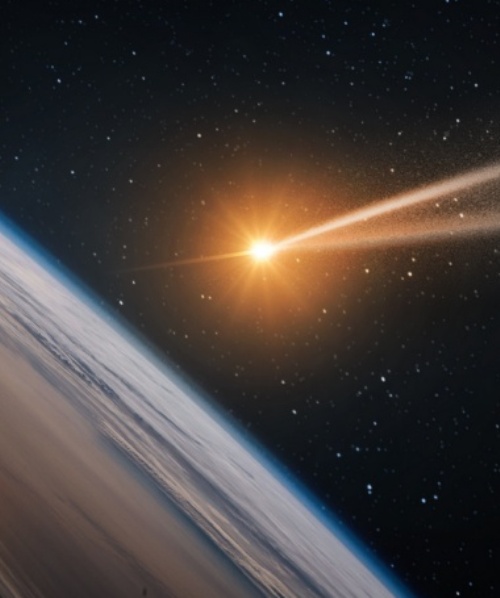Quintessence of Dust

If I mention the name Bennu, do you have any idea what I’m talking about? A clue: Bennu is 4.5 billion years old and parts of it, contained in a capsule, streaked through the atmosphere in a fireball and landed on target in Utah’s western desert last Sunday, after a 1.2 billion mile journey to Earth.
Bennu is an asteroid, fragments of which were collected as part of a Nasa-run scientific mission called Osiris-Rex over the last seven years. So millions of hours of scientists’ time and millions of dollars have been expended in finding and retrieving some dust? That may sound like a colossal waste of time and money, but the exciting thing about the dust from Bennu is that it holds clues to how the solar system formed and how life on our planet began. So pretty important then!
I can’t even begin to imagine how the scientists involved in this project managed to send Osiris-Rex into space, find Bennu, take the samples then get it back to Earth safely. However, I’m pretty confident that doing this involved some pretty hard maths (or math, perhaps I should say).

And after a brief celebration at their achievements in getting the fragments of Bennu back to Earth, now the hard work of analysing it begins. Some of the dust will be making its way to academic institutions in the UK, including the University of Manchester and the Natural History Museum.
Because I’m a headteacher, who has responsibility for the first stages of the life journeys of young people, whenever I read about projects like Osiris-Rex I always want to find out about the people involved and the academic journeys which led them to where they are now.
One of the scientists involved in the project is Dr Jason Dworkin, who is a scientist at Nasa. Interestingly, unlike many scientists in this field, Dr Dworkin didn’t study Maths or Physics at university, but Biochemistry, the study of the chemical processes of living organisms, although I suspect his maths is pretty strong. On the Nasa website there’s a really interesting question and answer with him.
When you were a child, what did you want to be when you grew up?
I wanted to be a scientist. I thought that being an astronaut on a rocket would be too loud, so I said I wanted to look at samples they brought back.
What sparked your interest in space and science?
I like knowing how things start. I've been interested in the origin of life since third grade. I liked dinosaurs as a kid, and was interested in where dinosaurs came from. The logical extreme of dinosaurs is the origin of life. In middle school I fell in love with chemistry and then how to apply it to study the origin of life.
Who inspired you?
My parents, my wife and daughter, my graduate advisor, and my high school biology teacher.
What is your favourite thing about the work you do?
I get to work with smart people to solve hard problems in new ways.
In the UK, two of the scientists involved in the project are Professor Sara Russell, who is a Researcher in Cosmic Mineralogy and Planetary Sciences at the Natural History Museum, and who studied at Cambridge University and the Open University, and Dr Sarah Crowther from the University of Manchester, who studied Chemistry at Oxford University, where she did research on the Electronic Spectrum of Selenium Dioxide.
Not that long ago all three of these eminent scientists were at school just like you are. At some point in their education they discovered a passion for science which then led them – with a lot of very hard work along the way – to where they are now. What is your passion? Maybe you haven’t discovered it yet, in which case you need to keep your options open and a broad mind, being open to lots of different academic disciplines and ideas. For me, that moment which changed everything happened not at school in fact, but in my university library when I read for the first time a two and half thousand line poem written in a strange dialect of English 650 years ago, which while not 4.5 billion years ago is pretty old for literature. There’s absolutely no reason why, with the opportunities available to you here, you couldn’t end up working for Nasa on cutting edge research, or in some similarly exciting field of work. I really hope that you will discover your academic passion while at school here; who knows where it might lead you!